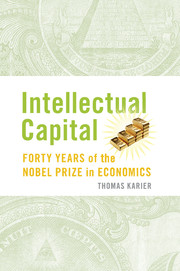Book contents
- Frontmatter
- Contents
- Preface
- Economic Nobel Laureates
- 1 An Economic Prize
- 2 Free-Market Economics
- 3 Micro: The Chicago School
- 4 Stock Market Casino
- 5 More Micro
- 6 Behaviorists
- 7 Keynesians
- 8 Classical Revival
- 9 Inventors
- 10 Game Geeks
- 11 General Equilibrium
- 12 A World View
- 13 Numbers Guys
- 14 History and Institutions
- 15 Reshaping the Prize
- Notes
- Index
- Frontmatter
- Contents
- Preface
- Economic Nobel Laureates
- 1 An Economic Prize
- 2 Free-Market Economics
- 3 Micro: The Chicago School
- 4 Stock Market Casino
- 5 More Micro
- 6 Behaviorists
- 7 Keynesians
- 8 Classical Revival
- 9 Inventors
- 10 Game Geeks
- 11 General Equilibrium
- 12 A World View
- 13 Numbers Guys
- 14 History and Institutions
- 15 Reshaping the Prize
- Notes
- Index
Summary
Does anyone doubt that people can make irrational choices based on bad information? And yet, for more than 100 years, free-market advocates were content to assume that people made perfectly rational decisions based on perfect information. The human beings that populated these microeconomic models were immune to jealousy, spite, procrastination, whims, regret, caprice, ignorance, and even errors. In other words, they were not really human at all. They were more like machines, programmed to always make the best choices in their own self-interest.
Not all economists were equally persuaded by this vision. Karl Marx in the mid-nineteenth century certainly harbored no illusions about capitalists making perfect decisions, but then again, he had no effect on mainstream economics. In the early twentieth century, Thorstein Veblen found a popular audience for a theory based on the idea that workers were motivated by a sense of workmanship. He also thought that consumers derived as much satisfaction from impressing others with their purchases as they did from the purchases themselves. This concept, which he called conspicuous consumption, seemed to explain some real but distinctly irrational behavior. He also left no lasting mark on conventional economics.
The economist who achieved the most success in changing this academic view of human nature was John Maynard Keynes. In his theory, Keynes saw animal spirits driving the stock market and faulty human judgments driving savings and investment decisions.
- Type
- Chapter
- Information
- Intellectual CapitalForty Years of the Nobel Prize in Economics, pp. 93 - 124Publisher: Cambridge University PressPrint publication year: 2010



